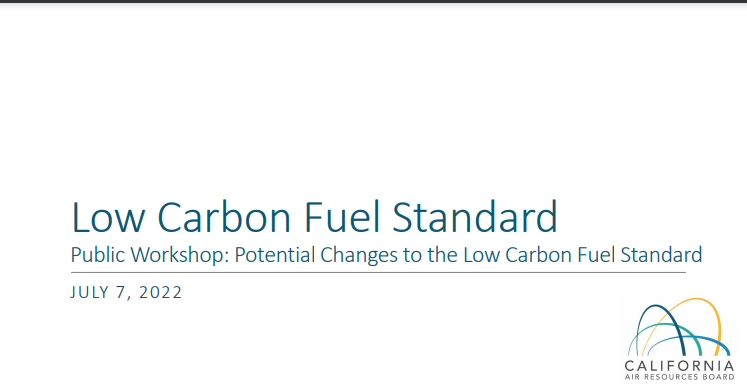CARB announced recently that they will be delaying their scheduled public hearing for amendments for the LCFS “until a later date”. There has not been an update on what the timeline is to implement new regulation but it is understood that this will present a significant delay in updated regulations being put into place. PineSpire submitted comments advocating for preserving opportunities for e-forklifts in the program by keeping the full amount of credits generated and transitioning gradually to a metering requirement.
Changes to Forklift Carbon Credits in California: CARB releases proposed Amendments to the LCFS Regulations
CARB recently released final version of Proposed Amendments to the LCFS Regulation. These amendments, which impact how e-Forklifts can generate carbon credits along with many other updates, are the result of well over a year’s worth of workshop, public comment, data collection, and updated LCFS market modeling. CARB will take a vote on adopting the Proposed Amendments on March 21, 2024
Metering Changes to Oregon’s Clean Fuels Program (CFP) Copy
Metering Changes to Oregon’s Clean Fuels Program (CFP)
The Oregon Department of Environmental Quality (DEQ) has recently announced changes to the Clean Fuels Program (CFP) that will require meters on forklifts to participate in the program. These changes will go into effect in Q4-23 and are part of an effort to improve energy use reporting. If you are currently participating in the CFP or have signed up for rebates, it is important to be aware of these changes.
Metering Changes to Oregon’s Clean Fuels Program (CFP)
Metering Changes to Oregon’s Clean Fuels Program (CFP)
The Oregon Department of Environmental Quality (DEQ) has recently announced changes to the Clean Fuels Program (CFP) that will require meters on forklifts to participate in the program. These changes will go into effect in Q4-23 and are part of an effort to improve energy use reporting. If you are currently participating in the CFP or have signed up for rebates, it is important to be aware of these changes.
Vice President of Sales: PineSpire Team Continues to Grow!
PineSpire is thrilled to announce Sara Shapiro has joined our team as our new Vice President of Sales.
Regional Sales Manager Opportunity!
Great opportunity for an experienced Sales Leader!
Territories covered: Washington State, Oregon, California, and BC, Canada (VERY little travel is required)
CARB Proposes Updates to the LCFS Regulation
The California Air Resources Board (CARB) recently held a workshop for stakeholders in the Low Carbon Fuel Standard program. The presentation included the much-anticipated proposed updates to the Carbon Intensity standards in the program as well as a few new concepts. PineSpire has summarized two key proposed changes for you below.
Operations Manager: PineSpire Team Continues to Grow
PineSpire is thrilled to announce Jen Colomb has joined our team as our new Operations Manager.
Goods Movement Program funds available for Electric Forklifts

The Bay Area Goods Movement Program has $20 million available in grant funding to replace diesel equipment with electric fueled equipment. Don’t miss out on a great opportunity for your equipment to be Zero-Emission Compliant before it is mandatory! The deadline to submit your application is Thursday, March 31st.
Eligible Applications include:
- Entities located in the BAAQMD (see below)
- Entities whose products or business are involved in Good Movement (manufacturing, warehousing, logistics)
- Replacement of Diesel cargo-handling equipment, transport refrigeration units, and rail-yard equipment
The Goods Movement Program was created to reduce diesel emissions and health risk from freight movement along California trade corridors as quickly as possible. The program is a partnership between CARB (the California Air Resources Board) and the BAAQMD (Bay Area Air Quality Management District) which includes Alameda, Contra Costa, Marin, Napa, San Francisco, San Mateo, Santa Clara, western portion of Solano, southern portion of Sonoma counties.
The program can be used to convert to electric forklifts, transport refrigeration units, rubber-tired gantry cranes, and other equipment. In addition to funding the equipment, the program can cover costs for associated new charging infrastructure.
When you decide to covert to an electric fleet now, you have the opportunity to receive grant funding, as well as become eligible to enroll in the LCFS (low carbon fuel standard) program. The LCFS program allows you to generate revenue each time you charge your electric equipment.
Additionally, electric equipment helps your operations stay in compliance with current and future regulations (like the proposed Zero Emission Forklift rule). Your bottom line will also benefit right away in reduced fuel costs and reduced maintenance costs.
To find out if your equipment is eligible for the Goods Movement Program, visit the Good Movement Program’s application page. Reach out to PineSpire to talk about your fleet strategy and making the most of these funding opportunities: contact@pinespire.com.
Come to the electric side!
Come See Us…2022 Trade Shows
2022 was here before we knew it, and it goes without saying that the past few years have made in person connections and networking a challenge. Working from home, wondering if people you see on Zoom are shorter than they appear and asking ourselves when things will go back to normal have all been constants during this time.
We don’t know if we’ll work in person any time soon or that video calls will go away, but what we do know is that here at PineSpire we want to see you again… in person! To make that happen, we will be attending some of the biggest conferences the West Coast has to offer, and we want you to join us.
Wrapping up January, we will be at Unified Wine & Grape Symposium in Sacramento, California from the 26-27th. Unified Wine and Grape will have an exposition including a wide range of products related to the wine and grape industry and includes international representation.
Following that, we will also be attending the Food Northwest Process & Packaging Expo on February 3-4th in Portland, Oregon– the expo is one of the largest in the United States and happens to be celebrating their 50th annual show by featuring world- recognized keynote speaker, John Manzella.
Lastly, we will be at the California League of Food Producer’s Food Processing Expo on February 15-16th in Sacramento and it is California’s largest food processing expo.
All these events will be great opportunities to:
- Learn about new industries
- Network with other businesses and potential clients
- Get caught up on trends coming up this year



